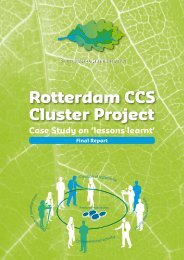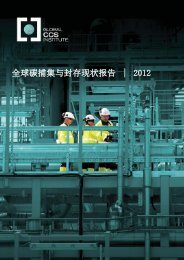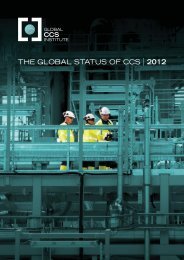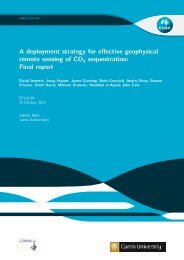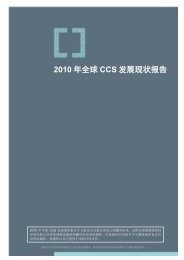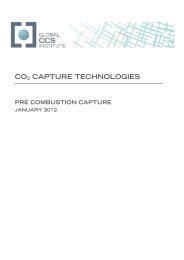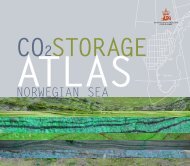Perceptions of CO2 Report - Global CCS Institute
Perceptions of CO2 Report - Global CCS Institute
Perceptions of CO2 Report - Global CCS Institute
- No tags were found...
You also want an ePaper? Increase the reach of your titles
YUMPU automatically turns print PDFs into web optimized ePapers that Google loves.
eflect how close the potential <strong>CCS</strong> implementation sites seemed to be, as had appeared duringthe discussion in the focus groups.In accordance with findings <strong>of</strong> Terwel and colleagues (2009) and Tokushige (2007) the strongestcorrelation to all <strong>CCS</strong> perceptions lay in how respondents rated the credibility <strong>of</strong> informationsources. Which information sources participants trusted was correlated with their perceptions <strong>of</strong><strong>CCS</strong> and its implementation options. Trust in public sector organisations such as localgovernments and UN agencies, as well as in national newspapers, and scientists, had a positivecorrelation with an accurate understanding <strong>of</strong> <strong>CCS</strong>. Trust in national NGOs, local NGOs, friends,and websites was negatively correlated with accurate understandings <strong>of</strong> <strong>CCS</strong>. This suggests thatmembers <strong>of</strong> the public with a poorer understanding <strong>of</strong> <strong>CCS</strong> are less likely to trust public sector andscientific sources—highlighting the need to find less formal mechanisms for outreach. The positiveeffect <strong>of</strong> the credibility <strong>of</strong> experts’ knowledge demonstrates that it is important for respondents tobe able to perceive information sources such as ‘developers’ or ‘scientists’ as knowledgeable andcompetent.Furthermore, and again echoing Ashworth and colleagues (2009a), opinions were more stablewhere respondents were better informed. Respondents who had indicated higher levels <strong>of</strong>awareness and knowledge <strong>of</strong> <strong>CCS</strong> were more certain <strong>of</strong> their opinion in either the favourable orunfavourable direction. Respondents with lower levels <strong>of</strong> awareness and self-rated knowledgewere more uncertain and tended to be slightly favourable towards <strong>CCS</strong>.Comprehension <strong>of</strong> <strong>CCS</strong>’s role as a global warming mitigation strategy exerted one <strong>of</strong> the strongestinfluences on the <strong>CCS</strong> impressions ‘positive’, ‘clean’ and ‘useful.’ This suggests that receivingmore background information about <strong>CCS</strong> and its potential role as a climate change mitigationtechnology assists in forming favourable opinions about it.More broadly, previous research has shown that providing information that is considered neutralregarding <strong>CCS</strong> may in fact lead to a decreased preference or support for <strong>CCS</strong> implementation(Itaoka et al., 2009). This calls into focus the need to consider other ways to present information,such as processes <strong>of</strong> small-group engagement (Ashworth et al., 2009b), and other dimensions <strong>of</strong>communication, such as trust in the information source (Ashworth, et al., 2009a).8.2.2 WHAT INFLUENCES ACCEPTANCE OF <strong>CCS</strong> IMPLEMENTATION?Regarding the implementation <strong>of</strong> <strong>CCS</strong> in their country, in their neighbourhood, and <strong>of</strong>fshore in thenearest ocean, many respondents (around 40%) had neutral opinions once they had viewed thebasic <strong>CCS</strong> information and diagram. Respondents were generally more favourable to <strong>of</strong>fshorestorage than onshore, although Japanese survey respondents were less favourable towards<strong>of</strong>fshore storage compared to respondents in Australia and the Netherlands.An understanding <strong>of</strong> the basic cause and effect <strong>of</strong> climate change was found to positively influencefavourable opinion on the implementation <strong>of</strong> <strong>CCS</strong> in the respondents’ country and <strong>of</strong>fshore, but noton implementation in the respondent’s neighbourhood. Understanding the relationship betweenCO 2 and climate change was positively correlated to support for the ‘in my country’ and ‘<strong>of</strong>fshore’implementation options, but not the ‘in my neighbourhood’ option. In the case <strong>of</strong> this ‘onshore’option, the influence <strong>of</strong> a basic cause-effect understanding <strong>of</strong> CO 2 and climate change seems to bereduced by perceptions that <strong>CCS</strong> is dangerous.Analysis could not fully explain initial opinions regarding <strong>CCS</strong> implementation; however, keyinfluencing factors included respondents’ values and beliefs, a person’s tendency to accepttechnology-related risk, and their level <strong>of</strong> support for the use <strong>of</strong> increased taxes to address climate44 | Understanding how individuals perceive carbon dioxide




